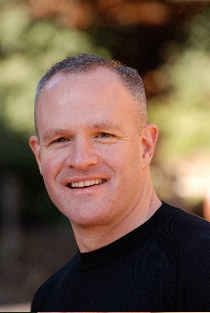
Jay Keasling from the University of California, Berkeley, will present “The Bold Future of Alternative Energy,” Tuesday, May 8, at 2:30 p.m. in the Hardin Hall auditorium. A reception begins at 2 p.m.
In 2009 Jay Keasling received the first Biotech Humanitarian Award for using synthetic biology to develop a microbial-based version of the antimalarial drug artemisinin at a cost affordable for the world’s poor. Nearly 1 million people, many of them children, die from the disease yearly.
The synthetic biology behind that medical breakthrough also set Keasling and colleagues on the road to producing the next generation of biofuels. Working with collaborating scientists, Keasling and associates at the Joint BioEnergy Institute have developed a strain of Escherichia coli to produce biodiesel fuel directly from biomass.
Now they’re seeking ways to maximize the efficiency by which the genetically engineered strain of E. coli can convert biomass to biodiesel. Developing carbon-neutral biofuels that provide a more secure energy future is a major push in synthetic biology, and Keasling is a leader in the field.
A native Nebraskan, Keasling is Chief Executive Officer and Vice President for Fuels Synthesis at the Joint BioEnergy Institute, which is one of three Bioenergy Research Centers funded by the U.S. Department of Energy to advance the development of the next generation of biofuels.
He is the Hubbard Howe Jr. Distinguished Professor of Biochemical Engineering in the Department of Chemical and Biomolecular Engineering and the Department of Bioengineering at the University of California, Berkeley, the co-author of over 230 refereed journal articles, and a partner on 14 patents. He also is Associate Laboratory Director of the Lawrence Berkeley National Laboratory; Director of the Synthetic Biology Engineering Research Center; and Nanyang Professor, Nanyang Technological University, Singapore.
More details at: http://go.unl.edu/r28